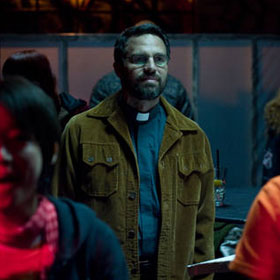Sympathy For Delicious

3.5/5
Mark Ruffalo, arguably one of the greatest actors of his generation, makes his directorial debut with Sympathy for Delicious. The film stars and is written by Christopher Thornton, a wheelchair bound actor and longtime friend of Ruffalo. The storyline of Sympathy is unique, there really isn’t another film like it, and though it doesn’t always hit its mark, there is something beautiful about the film.
Dean (Thornton), also known as Delicious D, is a recently paralyzed DJ living on skid row. When he realizes he possesses the power of healing, Father Joe (Ruffalo) puts Dean’s gift to use. Even as Dean heals countless others, he doesn’t have the ability to heal himself. Soon Dean feels exploited and thinks he isn’t getting enough in return, so he uses his gift on stage in a new rock band led by “The Stain” (Orlando Bloom). When problems arise, Dean must come to terms with his power and accept his gift for what it is.
The supernatural elements of Sympathy are treated in a realistic, serious manner. Delicious is actually able to heal people, who often have “incurable” diseases, using only his hands. Though it would be hard to accept in real life, Delicious’s power is relatively easy to accept in the film. This is partly due to the fact that Delicious isn’t willing to accept the power himself. He isn't a religious person, and when he attends a religious gathering with a phony faith healer, prior to the discovery of his gift, though he at first wants to believe in it, he rejects the entire process.
Religion is a major theme in the film. However, Sympathy isn’t necessarily a religious film. The plot revolves around Delicious’s journey, and though it is supernatural and spiritual, it is above all else a personal journey. The film is often critical of religion. The “faith healer” who Delicious visits is clearly meant to be seen as a fraud, collecting money on false pretenses. And even Delicious’s own actions, once he becomes a rock star, mirror this sort of exploitative practice. So even when the audience is asked to accept Delicious as a faith healer, there is never an insistence on accepting faith as an answer to the questions raised by the film.
Sympathy, aside from its unique storyline, is also slightly unconventional in its portrayal of unlikable characters. Many of the characters in the film use each other for their own personal gains, and they often do this without any form of forgiveness. Bloom’s character “The Stain,” is especially unlikable. He is supposed to be an obnoxious wannabe rock star, but he often times seems too obnoxious. Even Delicious himself is not the most likeable character. There is a definite selfishness to Delicious, especially early on, and he is generally in an unpleasant mood. Yet, by the end, Delicious seems to be redeemed and possesses some clarity on his situation. The redemption of the other characters is not quite as important, since the story belongs to Delicious.
The film’s jumps in time are slightly problematic. Delicious goes from being a nobody on skid row, to being a fairly famous healer, to being a wildly famous rock star, to being in prison, all within a short frame. It’s all a bit much to grasp onto. At times, the development of Delicious’s character can get lost in these large plot details, but for the most part the film works. One gets the sense that Delicious’s own feelings surrounding his power are equally quick and blurred, with very little room for clarity when he is being pushed towards the different paths his gift leads him down. Yet, even with some possible flaws in its execution, Sympathy for Delicious is a cinematic experience worth seeing.
1 Comments
Leave a comment
RELATED ARTICLES
Get the most-revealing celebrity conversations with the uInterview podcast!







Everything is here http://www.findsoso.com friends, please
enjoy viewing bar
Thanks